The 15 Best Video Streaming Platforms for Broadcasters in 2025
Video streaming has transformed how businesses, educators, and content creators connect with their audiences. Whether you are broadcasting live events, sharing on-demand content, or exploring video monetization platforms, choosing the right professional video streaming platform is key.
In 2025, the best video streaming platforms for broadcasters offer more than just video hosting. Look for features like adaptive streaming, AI-powered captions, secure video streaming platforms with DRM and SSO, low-latency video streaming platforms, multi-CDN support, and tools for OTT and FAST channel streaming. These capabilities help ensure reliable delivery, protect content, and drive engagement and revenue.
This guide reviews the 15 best video streaming platforms, including enterprise video streaming solutions and B2B video streaming solutions. We cover features, pricing, security, and use cases for sports, education, worship, and media companies, and show where Dacast fits as a top professional video streaming platform.
**Please note that video streaming platform features and pricing change regularly, and this post now reflects the most accurate information as of September 2025.
Table of Contents:
- Overview & Methodology (2025)
- B2B vs B2C (and when to use each)
- What to Consider When Comparing B2B Video Platforms
- Comparison of the 15 Best Video Streaming Platforms in 2025
- Why Choose the Dacast Video Delivery Platform?
- 2025 Video Streaming Features & Trends
- Choosing Between Video Streaming Platforms
- FAQs
- Conclusion
Overview & Methodology (2025)

Video streaming has become an essential tool for businesses across industries. In 2025, enterprise video streaming solutions are not just for marketing—they support internal communications, customer engagement, training, and monetization. According to streaming statistics, the enterprise video market is projected to grow to USD 31.4 billion by 2027.
Professional broadcasters and B2B organizations require platforms built for security, reliability, and scale. This guide evaluates the best video streaming platforms for broadcasters in 2025 using real-world criteria from businesses leveraging Dacast and other online video platforms.
Our methodology evaluates platforms based on:
- Pricing transparency and subscription options
- Monetization capabilities (SVOD, TVOD, AVOD)
- Security and compliance features, including DRM, SSO, and China delivery
- Latency and low-latency streaming support (SRT/WebRTC)
- API and SDK availability for custom integrations
- Multi-CDN support for global reach
- Support, SLA, and reliability
- User reviews and feedback
Sidebar: Why B2B video matters
- Enhanced engagement: Live webinars, product demos, and Q&A sessions help audiences understand products and services.
- Wider reach: Video breaks location barriers and enables global visibility.
- Thought leadership: Events and webinars position businesses as industry experts.
- Optimized marketing: Video content strengthens lead nurturing, marketing funnels, and conversion rates.
Several consumer-grade platforms exist, but professional broadcasters need enterprise-grade tools to ensure secure video hosting and delivery, reliability, and features tailored for B2B workflows.
B2B vs B2C (and when to use each)
Not all streaming platforms serve the same purpose. Free, consumer-focused services like YouTube and Facebook Live are great for creators who want reach and discoverability. Professional broadcasters, however, often need enterprise video streaming solutions that prioritize control, security, and monetization.
If your goal is to run a business around video, protect your content rights, or stream events on your own website, a B2B video streaming platform is usually the better fit. If you are a creator looking to grow an audience quickly, B2C platforms may be enough, or you can combine both with multistreaming. (See our guide on multistreaming for creators.)
Here’s a quick comparison:
| Factor | B2C Platforms (YouTube, Twitch) | B2B Platforms (Dacast, Kaltura) |
|---|---|---|
| Cost | Free to use, ad-driven | Subscription-based, free trials available |
| Content control | Limited rights, third-party ads/comments | Full rights, branding, no ads unless you add |
| Features | Basic analytics, chat, large audiences | Monetization tools, DRM, API, multi-CDN |
| Best for | Creators, gamers, casual live streams | Businesses, education, sports, enterprise |
Choosing between them depends on your goals: audience reach vs. professional-grade delivery. Many organizations use both: B2C for visibility and B2B for secure, branded video hosting and delivery.
What to Consider When Comparing B2B Video Platforms
Choosing the right B2B video platform isn’t about picking the cheapest option or the one with the most name recognition. It’s about finding a solution that delivers the features, security, and performance your business needs.
The ideal platform will keep your streams reliable, protect your content, and align with your monetization and integration goals. Use the checklist below to evaluate providers and identify which features are non-negotiable for your organization.
Here are the most important things you need to consider when comparing B2B video platforms.
Reliability
- Multi-CDN delivery for global reach and redundancy
- Adaptive bitrate streaming for smooth playback
- CDN-powered distribution without viewer limits
- 24/7 customer support & guaranteed uptime (SLA)
Latency
- Low-latency or ultra-low-latency streaming for real-time events
- Browser-based streaming for fast, simple live delivery
Monetization
- Multiple models: pay-per-view, subscriptions, ads
- Integrated paywall with global currency support
- SSL-encrypted payment processing
Security & Compliance
- DRM (digital rights management)
- Password protection for private streams
- Geographic/IP/domain restrictions
- Watermarking for brand/content protection
- Tokenized access control
APIs & SDKs
- Player API for customization
- Mobile SDKs (iOS/Android) for app integration
- White-label player (no third-party branding)
Analytics & Integrations
- Rich viewer analytics (location, watch time, engagement)
- Marketing integrations (HubSpot, Salesforce, etc.)
- Clickable CTAs within video player
- Live captions & accessibility features
Geography (China)
- Licensed CDN support for video delivery in China
- Compliance with Chinese streaming regulations
Support & SLA
- 24/7 customer service with fast response times
- Dedicated account management for enterprise clients
- Clear service-level agreements (uptime, latency, support windows)
Key Buying Criteria (2025)
When selecting a professional video streaming platform in 2025, look for features that ensure reliability, adaptability, and long-term scalability. Here are the essentials:
- Performance & Reliability
- Multi-CDN delivery for global reach and redundancy
- Adaptive bitrate streaming for smooth playback across devices
- 24/7 customer support with fast response times
- Remote Team Enablement
- Browser-based streaming for quick, low-friction broadcasts
- Live streaming for training, onboarding, and collaboration
- Expo video galleries to organize training and event content
- Chapter markers and screen sharing to simplify navigation and communication
- Branding & Marketing
- White-label players with logo customization
- Player APIs and mobile SDKs for branded app integration
- Analytics and marketing integrations (e.g., HubSpot, Salesforce)
- Interactive features like CTAs and live captions to boost engagement
Comparison of the 15 Best Video Streaming Platforms in 2025
With these key features in mind, you can now explore different video streaming platforms to see which best fits your live streaming goals. Consider which features are essential and which you can do without.
Enterprise Online Video Platforms (OVPs / B2B)
1. Dacast

Dacast is a unified streaming solution designed for professional broadcasters, enterprises, and educational institutions. It supports both live streaming and on-demand content with global reach and monetization options. The platform combines advanced security, analytics, and customization features for professional-grade streaming.
Basic Functionality:
Unified platform for live streaming and VOD, suitable for enterprises, schools, and professional organizations. Supports embedding, full content control, monetization, and China delivery.
Key Features:
- Secure, global content delivery, including industry-best video hosting
- 24/7 tech support with all plans, including email and live chat
- Video security features, including password protection and encryption
- RTMP (real-time messaging protocol), ingest, playback, and streaming support
- OTT Platform solutions to broadcast content across all devices
- Low-latency HTML5 channels for video streaming
- Expo galleries video portal
- Live encoding support for the top video encoders
- Player API access for 3rd party player integration
- Video API access on premium plans (event and scale)
- Multi-bitrate streaming
- Annual transcoding data included
- Real-time analytics
- Ad-free streaming
Pros:
- Live streaming and VOD packages on all pricing plans
- RTMP encoder enabled software
- Unlimited viewers and live channels
- Mobile streaming support
- White label and branding control
- Embeddable HTML5 video player
- Mobile device support
- Live stream recording
- China Video Hosting
- Plans for every budget
Cons:
- Takes a little bit of time to learn all of the features
Pricing:
Streaming solution plans with Dacast come at three levels. The video streaming pricing plans include the following:
- Starter: $39/mo (2.4 TB bandwidth, 500 GB storage)
- Event: $63/mo (6 TB bandwidth, 250 GB storage)
- Scale: $165/mo (24 TB bandwidth, 2 TB storage)
- Custom: Enterprise-grade custom plans
Read more here about live streaming pricing plans in more detail.
2. Uscreen

Uscreen is a full-service OTT platform designed for businesses that want to monetize video content. It allows creators and companies to launch subscription-based video services with branded apps across multiple devices.
Basic Functionality:
End-to-end video monetization platform with live and VOD hosting. Ideal for OTT subscription businesses.
Key Features:
- OTT apps for mobile, web, and TV
- Integrated paywall and subscription management
- Analytics dashboard
- Marketing and engagement tools
Pros:
- White-label and fully customizable
- Monetization built-in
- Simple for non-technical users
Cons:
- Limited advanced live-stream production tools
Pricing:
Starts at $49/mo (custom plans for enterprises)
3. Muvi

Muvi is a cloud-based video platform enabling enterprises to deliver live and on-demand content with full OTT capabilities. Its tools include monetization, app creation, and global delivery.
Basic Functionality:
Cloud-based OVP for live and on-demand content with OTT app creation and monetization.
Key Features:
- Multi-platform OTT apps
- Integrated CMS and billing
- DRM protection
- Multi-language support
Pros:
- Rapid deployment of branded apps
- Supports subscriptions, rental, and ad monetization
Cons:
- Somewhat complex pricing
Pricing:
Contact for custom pricing
4. Panopto

Panopto is a corporate-focused video platform designed for training, learning, and internal communications. It provides secure on-demand and live streaming capabilities.
Basic Functionality:
Enterprise-focused platform for video learning, training, and corporate communications.
Key Features:
- Lecture capture and VOD hosting
- Advanced search and analytics
- Secure internal sharing
Pros:
- Strong education/corporate focus
- Powerful search and indexing
Cons:
- Less suited for public OTT streaming
Pricing:
Contact sales for pricing
5. VIDIZMO
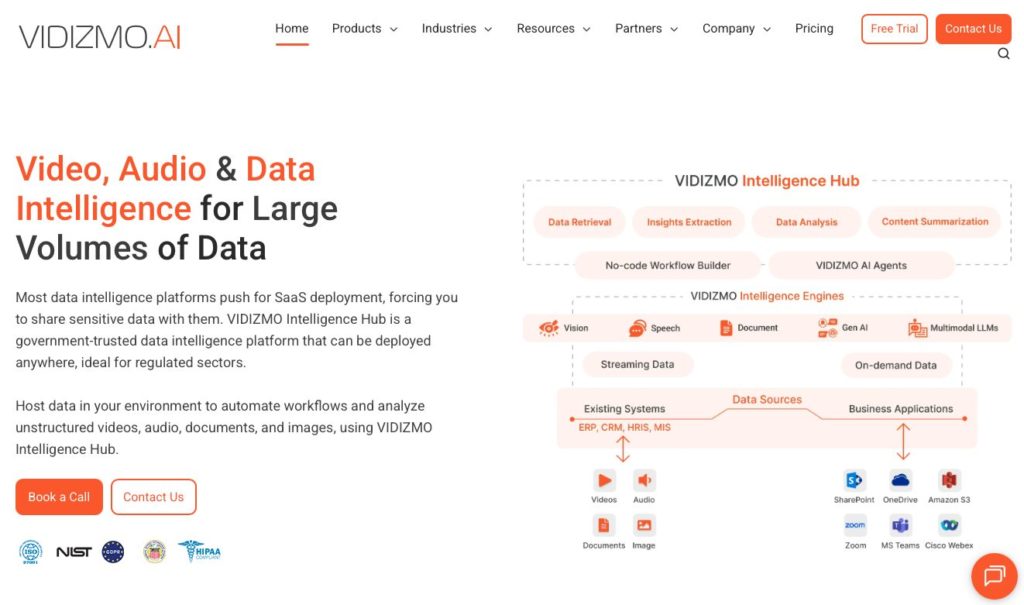
VIDIZMO provides enterprise-grade video streaming with security, DRM, and analytics for organizations needing a highly compliant platform.
Basic Functionality:
Secure video streaming for enterprises, government, and training. Supports live and on-demand content.
Key Features:
- Enterprise video portal
- DRM and AES encryption
- Advanced analytics and reporting
Pros:
- High security and compliance
- Custom branding
Cons:
- Primarily enterprise-focused, less intuitive for smaller teams
Pricing:
Custom enterprise pricing
6. VPlayed
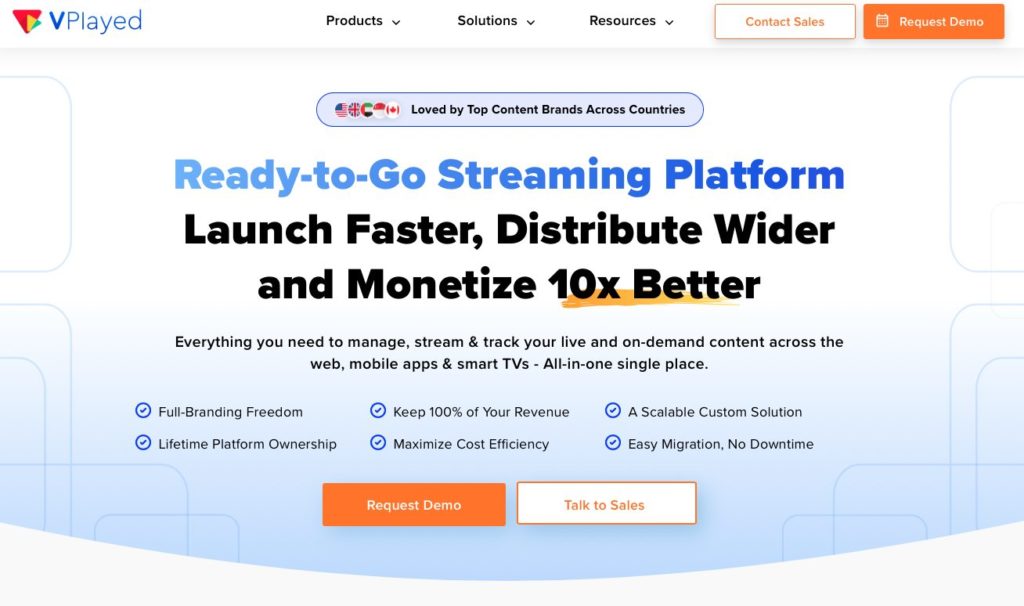
VPlayed is an online video platform for businesses that want live streaming, VOD, and OTT apps with monetization and multi-device support.
Basic Functionality:
OVP for live streaming, VOD, and monetization with OTT apps.
Key Features:
- Multi-device streaming
- Custom video portals
- Subscription and pay-per-view support
Pros:
- Robust security and DRM
- Suitable for large-scale broadcasting
Cons:
- Pricing not transparent
Pricing:
Contact for custom plans
7. Castr
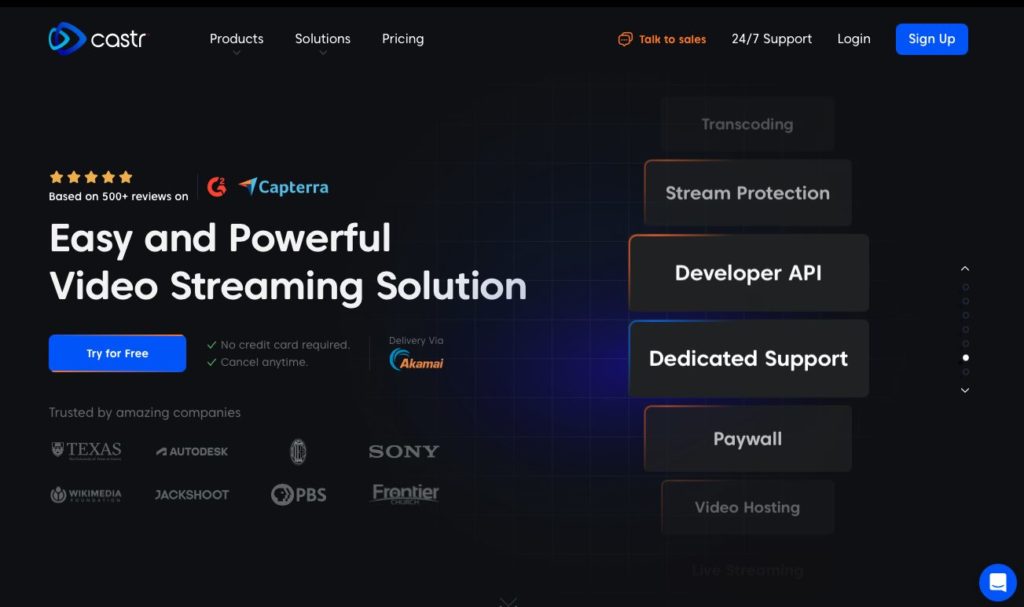
Castr is a multistreaming solution that allows businesses to broadcast simultaneously to multiple platforms while offering cloud recording and basic analytics.
Basic Functionality:
Multistreaming platform with VOD and live broadcast support.
Key Features:
- Live simulcast to multiple destinations
- Embeddable video player
- Cloud recording
Pros:
- Supports multiple platforms simultaneously
- Affordable options for small teams
Cons:
- Limited advanced analytics
Pricing:
Starts at $29/mo
8. Wistia (Enterprise)
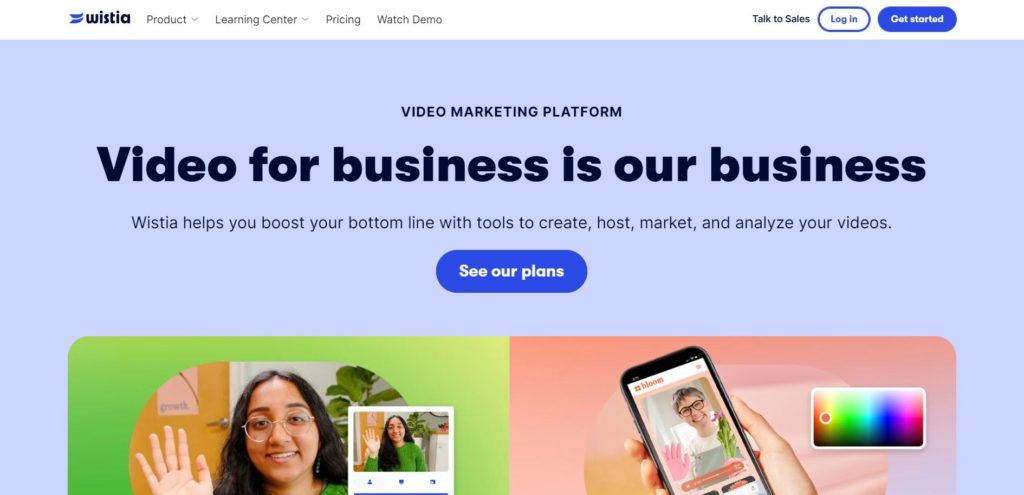
Wistia is an enterprise-focused video hosting platform with marketing and analytics features, designed to help businesses generate leads and analyze engagement.
Basic Functionality:
Video hosting platform with marketing and analytics focus, suitable for B2B enterprises.
Key Features:
- Embeddable player
- Heatmaps and engagement analytics
- Lead generation tools
Pros:
- Marketing-centric insights
- White-label branding
Cons:
- Limited live-streaming capabilities
Pricing:
Custom enterprise plans
9. Brightcove
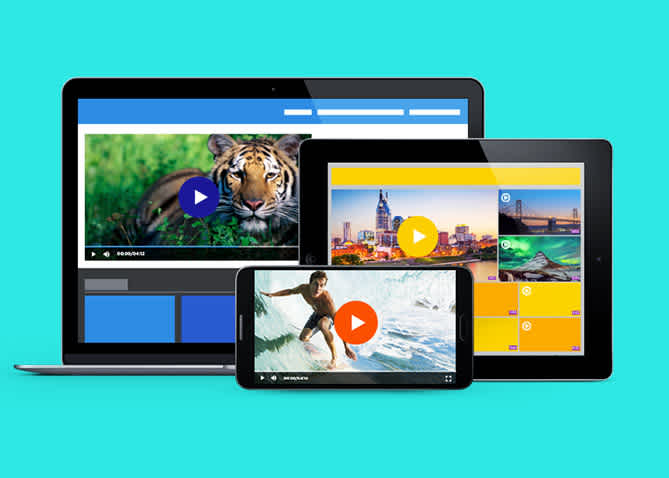
Brightcove is an enterprise video platform for marketing, monetization, and live/VOD streaming. It is widely used by larger organizations for professional-grade video delivery.
Basic Functionality:
Enterprise video platform emphasizing marketing, monetization, and live/VOD hosting.
Key Features:
- HTML5 player, live streaming, and VOD
- Advanced analytics
- Marketing and ad integrations
Pros:
- Strong app integrations and security
- Reliable enterprise support
Cons:
- Complexity for beginners
- Custom pricing required for full features
Pricing:
Contact sales (basic starts at $99/user/mo)
10. IBM Video Streaming
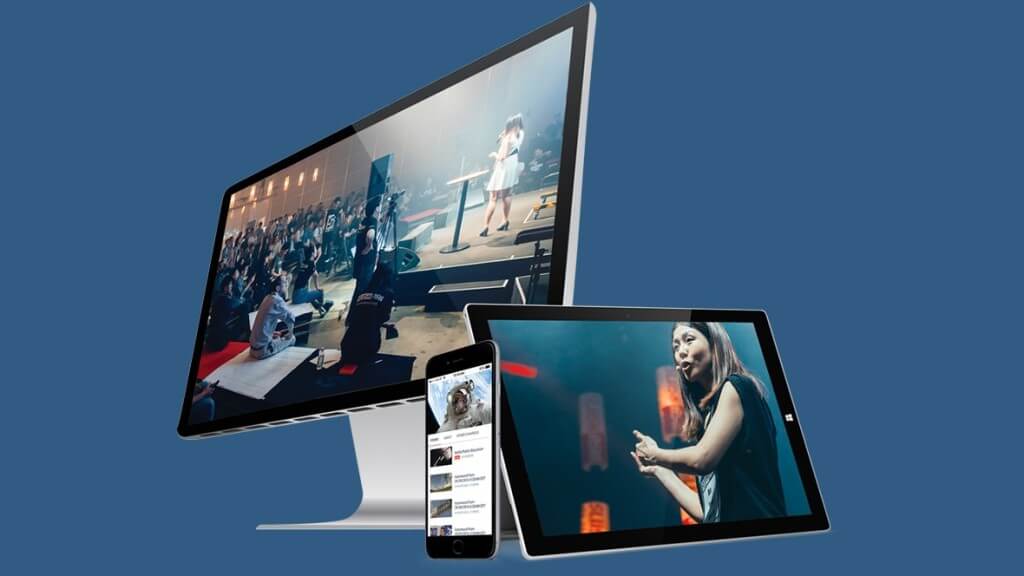
IBM Video Streaming (formerly IBM Cloud Video) is an enterprise-grade solution for live and on-demand content with a focus on secure, large-scale delivery.
Basic Functionality:
Enterprise-grade platform for live and on-demand video delivery.
Key Features:
- Secure enterprise streaming
- Internal content delivery network
- Analytics and live streaming support
Pros:
- Reliable and professional
- Supports large-scale events
Cons:
- Expensive
- Limited monetization options
Pricing:
- Silver: $137/mo,
- Gold: $688/mo,
- Platinum: $1,380/mo,
- Custom available
11. Wowza
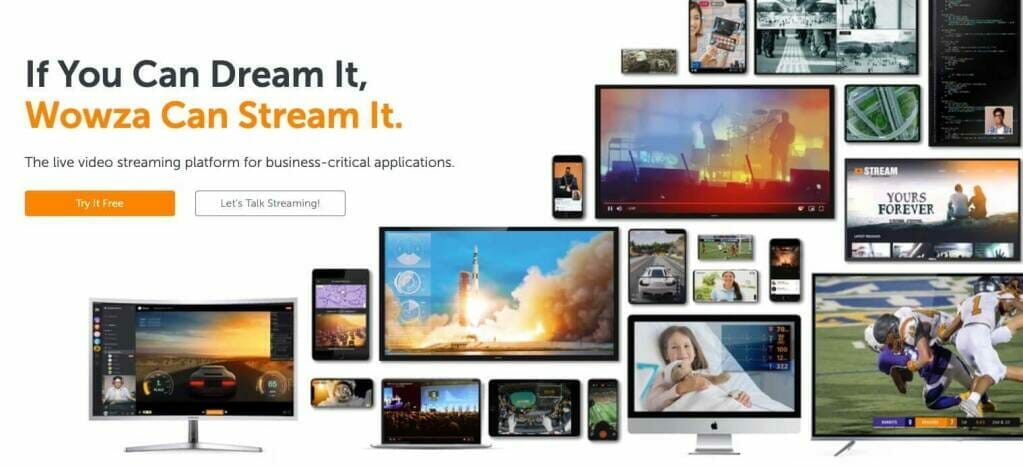
Wowza offers a flexible streaming platform for live and on-demand content, supporting multiple devices and custom integrations.
Basic Functionality:
Flexible cloud streaming platform for live and on-demand content.
Key Features:
- Live and VOD hosting
- API access and multi-bitrate streaming
- Simulcasting and China delivery
Pros:
- Strong security
- Supports a wide range of devices
Cons:
- Monetization requires integrations
Pricing:
Pay-as-you-go or custom enterprise plans
12. Kaltura
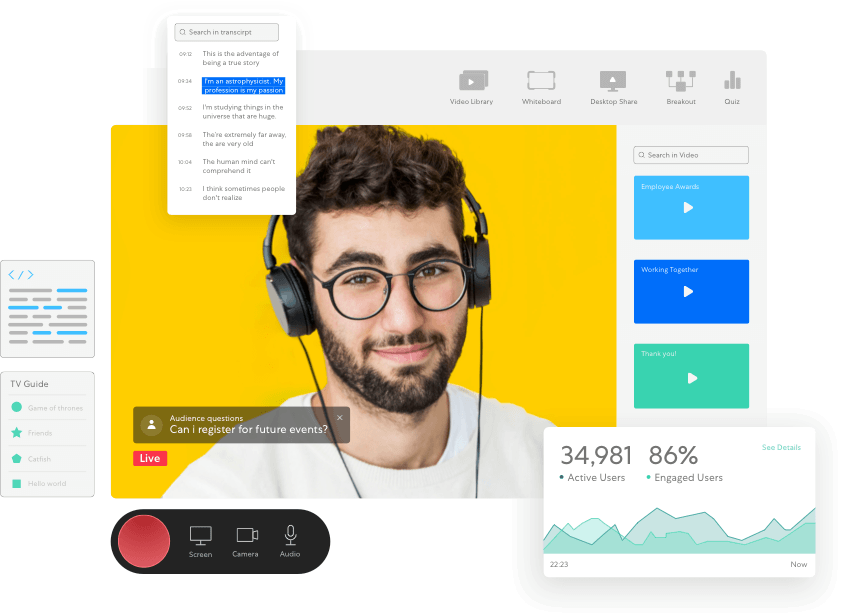
Kaltura is an open-source video platform that provides highly customizable streaming for enterprises, including virtual classrooms, webinars, and OTT apps.
Basic Functionality:
Open-source, highly customizable platform for live, VOD, webinars, and virtual classrooms.
Key Features:
- Unlimited on-demand videos
- Advanced integrations
- Flexible deployment options
Pros:
- Scales easily
- Powerful developer tools
Cons:
- Free version limited in storage and support
Pricing:
Tiered solutions: Business $150/mo, Enterprise custom
Social Destinations (B2C)
Most platforms support simulcasting from professional OVPs to expand reach.
13. Twitch

Twitch is the leading platform for gaming and entertainment live streams, with tipping and subscription monetization.
Basic Functionality:
Consumer-focused live streaming platform, primarily for gaming and tech audiences.
Key Features:
- Tools for tipping
- Live chat
- Channel subscriptions
Pros:
- Mobile broadcasting
- iOS and Android compatible
Cons:
- Consumer-focused
- Limited advanced streaming tools
Pricing:
- Free
- Subscriptions: $4.99–$24.99/mo
14. YouTube Live

YouTube Live allows creators to stream live and host VOD content with wide audience reach and ad monetization.
Basic Functionality:
Consumer-friendly live and VOD streaming, powered by Google.
Key Features:
- Ad-based monetization
- Embeddable videos
- Social sharing
Pros:
- Free
- User-friendly
- Wide audience reach
Cons:
- Limited content control
- No white-labeling
Pricing:
- Free
15. Facebook Live

Facebook Live enables businesses to stream to followers in real time and engage audiences with live comments and reactions.
Basic Functionality:
Live and on-demand streaming platform for social audiences.
Key Features:
- Live commenting
- Video embedding
- Paid ads for promotion
Pros:
- Free
- Familiar to users
- Easy engagement
Cons:
- Branding stays Facebook’s
- Time limits on live videos
Pricing:
- Free
Ecosystem Tools & Player SDKs
- OBS Studio – Free, open-source encoder for live streaming to multiple destinations.
- THEOplayer – Feature-rich HTML5 video player with SDK for developers, adaptive streaming, and DRM support.
Comparison Table
This table provides a side-by-side overview of the key features, pros, cons, and pricing of the top video streaming platforms. Use it to quickly identify which platform best fits your live streaming and on-demand video needs.
Platform | Basic Functionality | Key Features | Pros | Cons | Pricing |
Dacast | Live streaming and VOD hosting for businesses and organizations | Secure video delivery, password protection, encryption, RTMP support, multi-bitrate streaming, API access, Expo galleries, low-latency HTML5 player | Feature-packed, mobile-compatible, monetization options, China video hosting | Learning curve for features | Starter $39/mo, Event $63/mo, Scale $165/mo, Custom plan available |
Twitch | Social video platform for gaming and entertainment | Live chat, tips, channel subscriptions | Mobile broadcasting, familiar platform | Consumer-focused, limited advanced streaming tools | Free; subscription tiers for viewers ($4.99–$24.99/mo) |
Flowplayer | OVP for live and VOD streaming, white-label focus | High-quality player, monetization tools, SDK for apps | Mobile streaming, marketing tools, multiple monetization options | No China delivery, basic platform | Custom pricing; contact Flowplayer |
Vimeo | Cloud-based streaming and hosting | Live streaming, text/graphic overlays, collaboration, social share | User-friendly, professional interface, flexible storage | Limited live streaming tools, higher-tier plans expensive | Free, Starter $12/mo, Standard $25/mo, Advanced $65/mo, Enterprise custom |
YouTube Live | Consumer-focused live streaming | Ad monetization, embed options, social sharing | Free, familiar platform, easy embedding | Limited business control, no white-label, limited content ownership | Free |
IBM Video Streaming | Enterprise-grade live and on-demand platform | Reliable streaming, internal content delivery, strong support | Professional, large-scale streaming, China video hosting | Expensive, some features limited to high-tier plans | Silver $137/mo, Gold $688/mo, Platinum $1,380/mo, Custom available |
Wowza | Cloud streaming for live events and VOD | Video content management, HD streaming, robust security, API, simulcasting | Powerful security, multi-device support, China delivery | Monetization via integrations only | Live Event: One month $149, Pay as you go $2.50/hr, Enterprise custom; Streaming Engine: $195–$295/mo or custom |
Brightcove | Enterprise video platform for marketing and monetization | Video monetization, marketing tools, live streaming, analytics, app integrations | Strong privacy/security, many integrations | Custom pricing, complex for beginners | Custom; Basic $99/user/mo, Enterprise custom |
Facebook Live | Social live streaming | Facebook Live & Watch, Groups/Pages, live commenting, paid ads | Free, familiar platform, audience engagement | No monetization, time limits, Facebook branding | Free |
JW Player | Player-based platform with live streaming & VOD | HD streaming, monetization via ads, cloud CMS, video API | HD streaming, global delivery, recommendation engine | No China delivery, basic security, ad-based monetization only | Stream/Play/Engage/Monetize tiers; Enterprise custom |
Uscreen | B2B OTT & VOD platform | Subscription/pay-per-view monetization, analytics, branded apps | OTT-focused, monetization tools | Custom pricing, requires setup | Custom pricing |
Muvi | OTT & VOD platform for businesses | Multi-device streaming, monetization, analytics, app creation | All-in-one platform, white-label | Custom pricing, setup time | Custom pricing |
Panopto | Enterprise video platform for internal training & education | Screen capture, lecture capture, VOD, analytics | Best for training and education, secure | Limited external audience streaming | Custom pricing |
VIDIZMO | Enterprise video streaming and management | Secure streaming, VOD, live, analytics | Strong security, enterprise features | Custom pricing | Custom pricing |
VPlayed | OTT & VOD streaming for enterprises | Live & VOD, monetization, analytics, white-label | Enterprise-ready, customizable | Custom pricing | Custom pricing |
| Castr | Simulcasting and streaming | Multi-platform live streaming, RTMP, analytics | Easy multi-destination streaming | Limited VOD hosting | Starter $15/mo, Pro $49/mo, Premium $99/mo |
| Wistia (Enterprise) | Video hosting and marketing | Custom player, analytics, lead generation | Marketing-focused, easy embedding | Higher-tier plans required for advanced features | Custom pricing |
Why Choose the Dacast Video Delivery Platform?

When Dacast is the Right Fit
Dacast is ideal for businesses, organizations, and professional broadcasters seeking a secure, reliable, and feature-rich video streaming solution. Its platform supports both live streaming and on-demand video, with an HTML5 player that ensures compatibility across mobile, desktop, and tablet devices.
For organizations just getting started, Dacast’s Starter plan provides robust features—like password protection, encryption, and embeddable video—at just $39/month. Teams needing advanced capabilities such as API access, phone support, monetization tools, and paywall solutions can turn to the Scale Plan ($165/month), which includes 2,000 GB of streaming data and 24 TB of storage. For occasional or one-off events, the Event plan ($63/month) offers 6 TB of streaming data and 250 GB of storage, making it easy to broadcast without a long-term commitment.
With Dacast, you get professional-grade streaming at competitive pricing, whether your goal is consistent enterprise broadcasting, monetized video content, or ad-hoc live events.
2025 Video Streaming Features & Trends
The video streaming landscape is evolving rapidly in 2025. Platforms are increasingly incorporating advanced features that enhance security, engagement, and flexibility. Here are the top trends and features to watch:
AI-Powered Captions and Translation
Automated transcription and translation tools help broadcasters reach global audiences. AI-generated captions reduce production time and improve accessibility, while real-time translation opens new international markets.
AI Highlights and Moderation
AI-driven clipping and highlight creation automatically generates short-form content from long streams. Moderation tools powered by AI help filter inappropriate content, comments, or live chat messages to protect brand safety.
SSAI vs CSAI (Ad Insertion)
Server-Side Ad Insertion (SSAI) is increasingly preferred for seamless ad delivery, reducing buffering and ad-blocker interference. Client-Side Ad Insertion (CSAI) remains useful for highly interactive or personalized ad experiences.
Low-Latency Streaming: SRT and WebRTC
Protocols like SRT and WebRTC enable near real-time streaming with minimal latency, making them ideal for live auctions, sports, gaming, or interactive webinars. Choosing the right low-latency protocol is key for audience engagement.
Multi-CDN for Reliable Delivery
Using multiple CDNs ensures consistent video performance worldwide, reducing buffering and downtime even under heavy traffic or network congestion. Multi-CDN strategies are becoming standard for enterprise-grade streaming.
Security & Compliance
Enterprise platforms now emphasize DRM, SSO, SOC 2 compliance, and GDPR adherence. Robust security ensures content protection, regulatory compliance, and safe access control for sensitive or premium video content.
Migration Assistance
As businesses upgrade platforms, vendors increasingly provide migration support from solutions like Vimeo or Brightcove. This ensures seamless transition without downtime or loss of existing content.
Staying ahead in 2025 means choosing a platform that integrates these capabilities, allowing you to deliver professional, secure, and engaging video experiences across any audience or device.
Choosing Between Video Streaming Platforms
When choosing the B2B video platform for your business, you’ll want to check what types of plans are available and what level of commitment is required. You’ll also want to consider this if you’re not techy or don’t have very techy employees. Pay attention to the complexity of the platform, the support they offer, and the number of support documents they have.
Ultimately you want to go with the platform that fits your streaming budget and meets your needs in terms of features and capabilities.
Live Stream to Multiple Platforms Simultaneously

In some cases, why limit yourself to one platform? Sometimes it can be a good idea to use multiple platforms if, for example, you want to multiply your reach and chance of attracting new audiences with multistreaming. In this case, you’ll want to look for a video stream platform that supports simulcasting.
Suppose you have an audience on Facebook or YouTube. You can use a platform like Dacast to stream your content on both platforms while also streaming on your website— all at the same time.
To learn more about the other options, we dive deeper into this on our blog on live streaming to multiple platforms simultaneously.
FAQs
1. Which is the best video streaming platform for professional broadcasters in 2025?
The best platform depends on your needs, audience size, and budget. Professional broadcasters typically prioritize platforms that support live streaming, VOD, DRM, SSO, and enterprise-grade analytics. Top options for 2025 include Dacast, Brightcove, IBM Video Streaming, and Wowza.
2. What features should enterprises prioritize when comparing OVPs?
Enterprises should look for security features like DRM and password protection, multi-bitrate streaming for consistent quality, low-latency delivery for live events, and monetization tools such as paywalls or subscriptions. White-labeling and API access are also important for maintaining brand control and custom workflows.
3. Which platforms support DRM, SSO, and enterprise-grade security?
Leading enterprise-grade platforms such as Dacast, Brightcove, JW Player, Kaltura, and IBM Video Streaming provide full DRM support, single sign-on (SSO), AES encryption, and other enterprise security features. Social platforms like YouTube and Facebook do not provide these options, making them unsuitable for sensitive or high-value content.
4. What’s the difference between OVPs and free/social platforms like YouTube or Facebook?
OVPs (Online Video Platforms) provide full control over content, advanced analytics, monetization options, and enterprise-grade security. Free social platforms are easier to use and reach broad audiences, but they lack professional branding, robust analytics, and content protection.
5. Which platforms provide true China video delivery and compliance?
China has strict streaming regulations, so platforms like Dacast, IBM Video Streaming, and Wowza are among the few that can legally host content in China with proper licensing. Many global platforms, including YouTube and Facebook, are blocked or unreliable within the country.
6. How do SRT and WebRTC compare for low-latency live streaming?
SRT (Secure Reliable Transport) is ideal for high-quality, low-latency streams over unpredictable networks, especially for professional broadcasting. WebRTC delivers ultra-low latency (sub-second) for interactive experiences but can require more bandwidth and infrastructure. Choosing between them depends on your event type and latency requirements.
7. Can I migrate from Vimeo or Brightcove to Dacast without downtime?
Yes, Dacast offers seamless migration support for live and on-demand content. With proper planning, you can transfer videos, embed codes, and metadata with minimal disruption to your viewers. Our support team assists with migration to ensure continuity.
8. What are the hidden costs of streaming (bandwidth, storage, SSAI, transcoding)?
Streaming costs can go beyond subscription fees. Consider bandwidth usage, storage, server-side ad insertion (SSAI), live transcoding, and API access. Some platforms bundle these in plans, while others charge extra, so it’s important to review pricing carefully to avoid surprises.
9. How do I monetize my video content effectively?
Monetization options vary by platform and include subscriptions, pay-per-view, ads, and hybrid models. Professional OVPs like Dacast, Vimeo OTT, and Brightcove provide integrated paywalls and ad insertion, whereas social platforms mostly rely on limited ad revenue sharing.
10. Can I brand my video player and streaming pages?
Yes, enterprise platforms such as Dacast, Brightcove, and Kaltura allow full white-labeling, including custom logos, colors, and player UI. Social platforms like YouTube and Facebook display their own branding, which limits control over the viewer experience.
Conclusion
No matter which direction you go for top video streaming platforms; we hope this article has helped you to make a more informed decision.
Whatever your streaming goals, needs, and audience size, we’re here to help. Dacast offers an all-in-one professional streaming video hosting solution with no need to engage with intermediaries. In short, we guarantee our users an easy, seamless experience backed by our 24/7 streaming support service and a complete knowledge base.
Remember: take the time to compare price, reliability, and other important features you’ll need before committing to a streaming solution service. Also, take advantage of free trials whenever possible.
Try Dacast risk-free with our 14-day free trial and explore all the features for yourself.
Join our LinkedIn group for regular streaming tips and exclusive offers. Thanks for reading, and good luck with your live broadcasts!
 Stream
Stream Connect
Connect Manage
Manage Measure
Measure Events
Events Business
Business Organizations
Organizations Entertainment and Media
Entertainment and Media API
API Tools
Tools Learning Center
Learning Center Support
Support Support Articles
Support Articles